For the first time ever, Manitoba Egg Farmers invites the public to attend a working egg farm
Celebrating the Grand Opening of the Manitoba Egg Farmers Learning and Research Centre at University of Manitoba’s Glenlea Research Station – the first public egg research, education and training facility in Canada
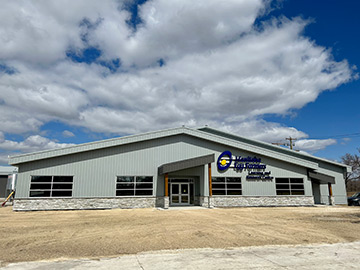
WINNIPEG, April 26, 2023 – Today, the Manitoba government, Manitoba Egg Farmers (MEF) and the University of Manitoba (UM) are celebrating the Grand Opening of the 22,000 square foot Manitoba Egg Farmers Learning and Research Centre at UM’s Glenlea Research Station. During a ribbon-cutting ceremony, MEF handed the keys to the new facility over to the UM and officially opened the facility to the public.
“Our government is pleased to have partnered with the government of Canada through the Canadian Agricultural Partnership to provide $1.5 million in funding to support ongoing research at UM through the Glenlea Research Station,” said Manitoba Agriculture Minister Derek Johnson. “We look forward to seeing this research put into action in advancing Manitoba’s egg production industry.”
“Equipped with the latest state-of-the-art equipment, smart internet cloud-based technologies and designed to foster collaborations to advance Manitoba’s egg industry for the next 20 years and beyond, this is the first interpretive egg/layer research, education and training facility in all of Canada,” said MEF Chair Catherine Kroeker-Klassen.
“This new facility represents what we can accomplish when we work together to support scientific discovery and training here in Manitoba. As the demand for sustainable protein sources grows, UM is uniquely positioned to lead the research innovation needed to advance the egg sector for generations to come,” said UM Vice-President (Research and International) Dr. Mario Pinto.
This new, state-of-the-art facility will advance and enhance research on modern egg production techniques and technologies and showcase what modern egg farmers do every day for the benefit of the public. The new facility features two bio-secure barns; one free-run aviary and one with enriched housing. There are windows into each barn for the public to view, and research space in the private section of the building for students and researchers from the University of Manitoba to conduct research and learn about eggs and laying hens.
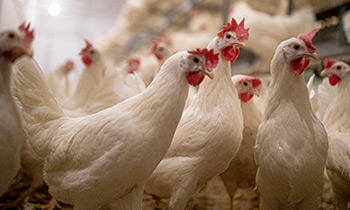
Free-Run Aviary Housing
Free-Run Aviary Housing allows the hens access to the entire barn area. Aviary housing provides a multi-tiered system of enrichments for the hens, where they are able to perch, scratch and lay their eggs in nesting boxes.
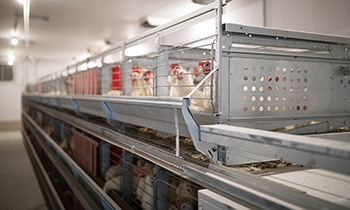
Enriched Housing
Enriched housing combines the food safety benefits of conventional housing with the welfare benefits of open housing. Hens are able to perch, scratch and lay their eggs in nesting boxes.
The first new complete poultry build at a Canadian university in 30 years, the one-stop research hub will facilitate scale-up validation of lab findings in a commercial setting featuring paired free-run aviary and enriched layer housing system. It is the only research facility with the capacity for in-depth multi-replicate studies as well as comparison studies between the two housing systems.
Other features of the facility include:
- 3 controlled environment research rooms
- Egg quality and post-mortem laboratories
- Staff and student areas
- Public viewing and program delivery area
- Meeting spaces
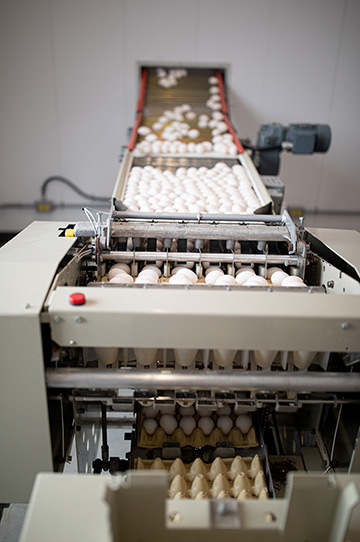 Adding to the unique public engagement capacity of the co-located Bruce D. Campbell Farm and Food Discovery Centre and the Dairy Farmers of Manitoba Discovery and Learning Complex, the UM will be unparalleled in its capacity to showcase modern animal agriculture to the public in a setting structured and resourced for building trust.
Adding to the unique public engagement capacity of the co-located Bruce D. Campbell Farm and Food Discovery Centre and the Dairy Farmers of Manitoba Discovery and Learning Complex, the UM will be unparalleled in its capacity to showcase modern animal agriculture to the public in a setting structured and resourced for building trust.
Fostering public trust in egg farming is critical and will come through targeted public engagement programming and creation of knowledge. Validated through the scientific process, this information can be used to improve public confidence and develop informed policy in Manitoba. The public viewing galleries of the two housing areas will further instill confidence in the manner in which hens are raised and cared for on Manitoba farms.
“Integrated learning and hands-on training in the most modern layer housing systems, representing where industry is headed, rather than what it is leaving behind, is essential for aligning skills training with industry needs and provides UM students with a unique edge over those from any other Canadian university,” said Pinto.
It’s important to Manitoba’s egg industry that we open the barn doors and show consumers how eggs are produced, and how hens are housed in Canada. Currently, 40% of hens in Manitoba are housed in enriched housing and 11% are housed in free-run aviary housing. (data current as of December 2022)
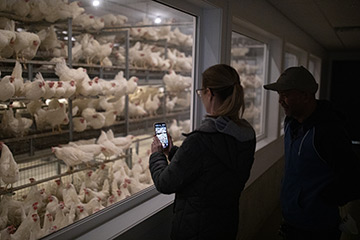 Why hasn’t the public been able to visit egg farms?
Why hasn’t the public been able to visit egg farms?
“Biosecurity is imperative to keep hens healthy and food safe on egg farms which means that the public has – until now – been unable to tour working egg farms,” said MEF Board Chair Catherine Kroeker-Klassen. With the new facility’s completion, the public is now finally invited to visit a real egg farm at the Bruce D. Campbell Farm and Food Discovery Centre.
“Windows protect the hens and maintain biosecurity, and staff and researchers are trained on how to prevent diseases that could harm the hens by changing their footwear, washing vehicles, wearing protective equipment and washing their hands – the same things farmers do every day on their own farms,” said Kroeker-Klassen.
In Manitoba, egg farmers practice strict biosecurity protocols to defend against diseases that could affect the health of their birds. (see appendix)
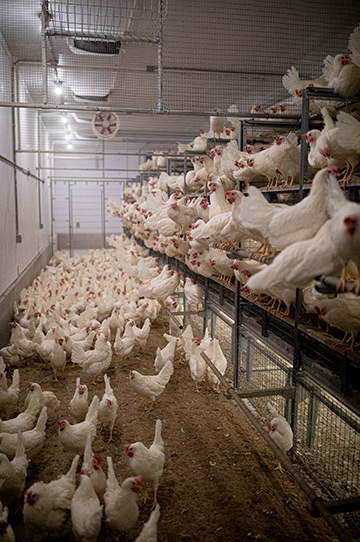
How was the facility funded?
The new facility was funded in part by the Canadian Agricultural Partnership, and in part by Manitoba’s 170 egg farming families.
The governments of Canada and Manitoba provided $1.5 million for Manitoba Egg Farmers (MEF) to establish the MEF Learning and Research Centre. Funding for this initiative was provided under the Canadian Agricultural Partnership, which was a five-year (2018-2023), $3-billion investment by Canada’s federal, provincial and territorial governments to strengthen and grow Canada's agri-food and agri-products sectors. This commitment includes $2 billion for programs cost-shared by the federal, provincial and territorial governments that are designed and delivered by provinces and territories.
About Manitoba Egg Farmers – We’re Egg Farmers We Love What We Do®
Manitoba Egg Farmers (MEF) represents 170 regulated egg and pullet farmers in our province. MEF is an independent organization, funded entirely by egg and pullet farmers. Regulated egg farmers are the primary caregivers of their hens that produce over 76 million dozen eggs each year and feed all communities across Manitoba. Eggs are nutritious, versatile and can be eaten with any meal. Buy local eggs at your favourite Manitoba grocery store! For more information about egg farming in Manitoba, hen care or recipes visit eggs.mb.ca.
About University of Manitoba’s Faculty of Agricultural and Food Sciences
The UM’s Faculty of Agricultural and Food Sciences offers high-calibre relevant teaching programs which range from diploma and degree to graduate studies across many disciplines. Its researchers work to address the complex challenges facing the agricultural and food industry and to pursue answers to broader environmental and health-related questions.
- 30 –
For more information:
Claire McCaffrey
Communications Specialist, Manitoba Egg Farmers
p: 204-488-4886 | e: cmccaffrey@eggs.mb.ca
Crystal Jorgenson
Communications Specialist, Faculty of Agricultural and Food Sciences, University of Manitoba
p: 204-474-9435 | e: crystal.jorgenson@umanitoba.ca
Appendix
What is biosecurity? | Biosecurity: Protect Poultry, Prevent Disease
Biosecurity is the program used to protect poultry from the introduction and spread of infectious diseases. Biosecurity is critical on egg farms and is the reason MEF has not been able to invite the public to egg farms in the past. Some of the biosecurity protocols that are typical on egg farms include:
- changing foot attire when visiting the premises;
- wearing protective clothing such as booties, masks, gloves and coveralls;
- limiting visitations to appointment only and tracking anyone coming onto the property;
- constantly monitoring bird health; and
- sanitizing vehicle tires and wheel wells upon entering and exiting the property, or requesting visitors wash their cars before coming onto the property (especially if they’ve recently visited another farm.)
Thank you for respecting biosecurity! We can’t wait to have you visit the MEF Learning and Research Centre.

